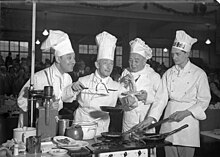Paul Graetz (cabaret artist)

Paul Graetz (born July 2, 1890 in Glogau (according to IMDb August 4, 1889 in Berlin ), † February 16, 1937 in Hollywood ) was an important comedian in the theater and cabaret scene in Berlin in the 1920s . He was also a film actor.
Life
Paul Graetz was born in 1890 to a Jewish merchant family. Graetz began his acting career in 1911 at the New Theater in Frankfurt am Main. In 1916 he moved to the Deutsches Theater in Berlin, where he made his debut under the director Max Reinhardt in the Kaufmann von Venice . In 1919 Graetz was involved in a revival of the cabaret Schall und Rauch , where he brought pieces by Kurt Tucholsky and Walter Mehring to the stage. In 1925 Graetz left the ensemble of the Deutsches Theater and worked as a freelance film and stage actor. In 1928 he appeared in the comedians' cabaret and in Alt-Bayern . Paul Graetz was one of the first artists in Germany to work in sound films. In August 1928, the first sound film sketch with him in the leading role came into the cinemas. Other short films such as "100 Words of Sound Film" (1929) followed.
On January 18, 1930, Sturm was performed via Berlin , the artists involved included Graetz, Ernst Busch , Rosa Valetti and Karl Valentin . In 1931 Graetz appeared again in a performance by Max Reinhardt, the staging of Hoffmann's stories in the large theater. In the film, he played mostly comical and grotesque characters. In January 1933, shortly before the " seizure of power ", Graetz recorded eyes of the city by Kurt Tucholsky in a recording studio .
Paul Graetz fled from the National Socialists to England on February 28, 1933 . His Jewish origins and the criticism of National Socialism, which he expressed in his plays, threatened to become his undoing under the new rulers. In London he learned English intensively and initially took on small film roles. In 1934 he played on the side of the still unknown Errol Flynn in Murder at Monte Carlo . He also had a role in the British film adaptation Jew Süss . Also in England in 1935 was Mr. Cohen Takes a Walk with Paul Graetz in the title role, the only film with him in the lead role. At the end of December 1935 he traveled on to New York and later to Hollywood . There he got roles in several B-films . In February 1937, shortly before filming Maria Walewska began , Graetz died at the age of only 46.
Among other things, he received his reading Heimweh nach Berlin as a two-hour long audio document.
Sound recordings
- Sing in the yard . Kurt Tucholsky as a cabaret writer. (Original recordings with Paul Graetz, Kate Kühl , Claire Waldoff , Trude Hesterberg , Ernst Busch , Annemarie Hase , Curt Bois and others) duo-phon records Berliner Musenkinder (CD 05 05 3), 1999
- Paul Graetz - homesickness for Berlin . Double CD. Edition Mnemosyne, 2000. ISBN 3-934012-14-0
- CD1: Chansons and texts by Paul Graetz, Friedrich Hollaender , Walter Mehring , Kurt Tucholsky a . a.
- CD2: ... and where did I play marbles? . Feature about Paul Graetz from Volker Kühn .
Filmography
|
|
literature
- Klaus Budzinski , Reinhard Hippen : Metzler Cabaret Lexicon. Metzler, Stuttgart et al. 1996, ISBN 3-476-01448-7 .
- Kay Less : The film's great personal dictionary . The actors, directors, cameramen, producers, composers, screenwriters, film architects, outfitters, costume designers, editors, sound engineers, make-up artists and special effects designers of the 20th century. Volume 3: F - H. John Barry Fitzgerald - Ernst Hofbauer. Schwarzkopf & Schwarzkopf, Berlin 2001, ISBN 3-89602-340-3 .
- Kay Less: 'In life, more is taken from you than given ...'. Lexicon of filmmakers who emigrated from Germany and Austria between 1933 and 1945. A general overview. ACABUS-Verlag, Hamburg 2011, ISBN 978-3-86282-049-8 , p. 206 f.
Web links
- Paul Graetz in the Internet Movie Database (English)
- Pictures by Paul Graetz In: Virtual History
- Kabarettarchiv.de: Paul Graetz (pdf; 73 kB)
- Lutz Herden: Gone, Gone, Never Again , in: Friday , February 26, 2012.
- Paul Graetz as servant Paul
Individual evidence
- ^ Speech and sound film, in: Vossische Zeitung, August 19, 1928, p. 21
- ↑ In contrast to the later German propaganda film Jud Süß, it was a direct adaptation of the Feuchtwanger novel of the same name .
- ↑ Austrian Film Museum: Jew Süss (1934)
| personal data | |
|---|---|
| SURNAME | Graetz, Paul |
| BRIEF DESCRIPTION | German cabaret artist, comedian and actor |
| DATE OF BIRTH | July 2, 1890 |
| PLACE OF BIRTH | Glogau |
| DATE OF DEATH | February 16, 1937 |
| Place of death | Hollywood |